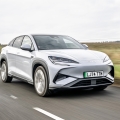European automakers and suppliers convened with Commissioner Séjourné as part of the EU’s Strategic Dialogue on the future of the auto industry, reinforcing the need for a comprehensive approach to zero-emission vehicle (ZEV) manufacturing. The meeting underscored that regulation alone cannot ensure Europe’s leadership in the global transition to sustainable mobility.
The automotive sector faces an increasingly challenging landscape, as highlighted in Mario Draghi’s recent report, which warns of a critical gap between climate and industrial policy. European automakers are grappling with global competition for raw materials, rising production costs, shifting geopolitical dynamics, and an EV market still in its developmental stages. Without a holistic industrial strategy, the region risks losing its competitive edge.

Sigrid de Vries, Director General of the European Automobile Manufacturers’ Association (ACEA), emphasised that achieving zero-emission mobility requires more than simply replacing combustion engines with electric powertrains.
“The shift to zero-emissions means far more than a simple switch from one vehicle technology to another; we need a broader ecosystem approach that incentivises new value chain partnerships,” she stated.
De Vries called for a paradigm shift in how the EU approaches regulation, arguing that piecemeal mandates for different parts of the value chain will not be sufficient. Instead, a comprehensive industrial framework is needed—one that fosters innovation, secures Europe’s role as a leading manufacturing hub for ZEVs, and ensures long-term industrial sustainability.
Benjamin Krieger, Secretary General of CLEPA, the European Association of Automotive Suppliers, echoed these concerns. He stressed the need for a more flexible regulatory approach that embraces technological diversity and supports early-stage breakthroughs.

“Without targeted support, groundbreaking ideas will never hit the road. The future of EU mobility depends on building on our strength in innovation and ensuring we scale and industrialize new technologies faster,” Krieger said.
To facilitate this, Krieger advocated for a streamlined funding framework that aligns pre-competitive support with major industrial initiatives such as Important Projects of Common European Interest. This, he argued, would help mitigate investment risks while accelerating the commercialisation of sustainable mobility solutions.
Key industry leaders insist that Europe must rethink its approach to regulation and incentives if it hopes to maintain its status as an automotive powerhouse. The technology list in the EU’s Net-Zero Industry Act provides a starting point, but stakeholders agree that stronger policy coordination and targeted financial support are needed to drive the transformation.
As global competition intensifies, European policymakers must act swiftly to develop an industrial policy that complements climate goals. Only by fostering an integrated ecosystem—one that aligns regulation, funding, and technological innovation—can the EU ensure its leadership in zero-emission manufacturing.









